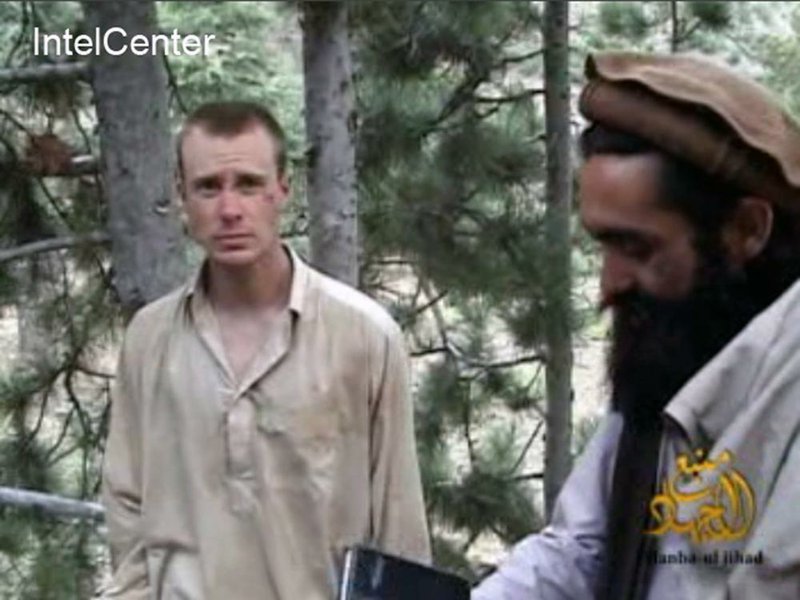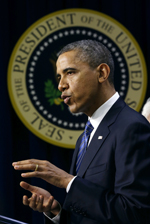KABUL - Afghan President Hamid Karzai eased his opposition Thursday to joining planned peace talks with the Taliban, saying he is willing to participate as long as a Taliban flag and a nameplate with their former regime’s name is removed from their office in Doha, Qatar, and the U.S. issues a formal written statement supporting the Afghan government.
On Thursday, Karzai spokesman Fayeq Wahidi said the Afghan president will join the talks as long as the U.S. follows through on those conditions, which he said Secretary of State John Kerry agreed to over the phone with Karzai.
He said Kerry also promised the U.S. would make clear that the Taliban office would not be seen as an embassy or government-in-exile.
The Taliban held a ribbon-cutting ceremony in Doha on Tuesday in which they hoisted their flag and a banner that evoked the name they used while in power more than a decade ago: “Political Office of the Islamic Emirate of Afghanistan.”
A decision on whether to also restart security-agreement talks with the U.S. would be made after those assurances, Wahidi added, referring further questions to the Foreign Ministry. Karzai on Wednesday also had suspended those talks, which focus on a bilateral plan that would cover American troops who will remain behind after the 2014 withdrawal of NATO troops.
On Thursday, the “Islamic Emirate” nameplate had been removed from the Taliban office and replaced with a sign that read simply “Political Office of the Taliban.” The flagpole inside the compound apparently was shortened and the Taliban flag - dark Koranic script on a white background - was still flying but not visible from the street.
Journalists gathered at the office shot images of the flag through the gaps in the walls. Afghan Embassy officials also were seen there Thursday morning, snapping photographs of the scene.
A statement Thursday by the Qatari Ministry of Foreign Affairs, quoted by the Qatar News Agency, said that the office should be known as “the Political Bureau of the Afghan Taliban in Doha and not the political bureau of the Islamic Emirate of Afghanistan.”
U.S. Deputy Ambassador Rosemary DiCarlo told the U.N. Security Council on Thursday that the U.S. is “pleased that Qatar has clarified that the name of the office is the Political Office of the Afghan Taliban, and has had the sign with the incorrect name in front of the door taken down.”
The Taliban have long refused to talk to Karzai’s representatives, but the opening of the office was seen as a first step toward those meetings.
The U.S. expectation had been that U.S.-Taliban talks would be followed several days later with direct talks between the Taliban and a Karzai peace delegation.
The U.S. began secret talks with the militants more than two years ago in off-and-on discussions that lasted several months.
The two sides discussed prisoner exchanges and for a brief time it appeared that five Guantanamo Bay, Cuba, prisoners would be released and sent to Qatar to help further the peace process.
But Karzai, furious that he had not been told of the talks in advance, demanded that the Taliban operatives be returned to Afghanistan rather than Qatar.
Since then, the U.S. has been trying to jump-start peace talks and the Taliban have made several offers - including sharing power in Kabul. The Taliban also have attended several international conferences and held meetings with representatives of about 30 countries.
Senior Taliban spokesman Shaheen Suhail said Thursday that the Taliban are insistent that they want their first interlocutors to be the United States.
“First we talk to the Americans about those issues concerning the Americans and us [because] for those issues implementation is only in the hands of the Americans,” he said.
“We want foreign troops to be pulled out of Afghanistan,” he added. “If there are troops in Afghanistan, then there will be a continuation of the war.”
Suhail indicated the Taliban could approve of American trainers and advisers for the Afghan troops, saying that “of course, there is cooperation between countries in other things. We need that cooperation.”
He said that once the Taliban concluded talks with the United States, they would participate in all-inclusive Afghan talks.
Suhail ruled out exclusive talks with Karzai’s High Peace Council, which has been a condition of the Afghan president, who previously said he wanted talks in Doha to be restricted to his representatives and the Taliban. Instead, the Taliban would talk with all Afghan groups, Suhail said.
“After we finish the phase of talking to the Americans, then we would start the internal phase … that would include all Afghans,” he said. “Having all groups involved will guarantee peace and stability.”
SWAP PROPOSED
On Thursday, the Taliban proposed a deal in which they would free a U.S. soldier held captive since 2009 in exchange for five of their most senior operatives at Guantanamo Bay.
U.S. negotiators hope the freed prisoners would join the peace process but fear they might simply return to the battlefield.
The proposal to trade U.S. Army Sgt. Bowe Bergdahl for the Taliban detainees was made by Suhail in response to a question during a phone interview from the Doha office.
The prisoner exchange is the first item on the Taliban’s agenda before even starting peace talks with the U.S., said Suhail, a top Taliban figure who served as first secretary at the Afghan Embassy in the Pakistani capital of Islamabad before the Taliban government’s ouster in 2001.
President Barack Obama’s administration was noncommittal about the proposal, which it said it had expected the Taliban to make.
Bergdahl, 27, of Hailey, Idaho, is the only known American soldier held captive from the Afghan war. He disappeared from his base in southeastern Afghanistan on June 30, 2009, and is believed held in Pakistan. Suhail was quoted as saying Bergdahl “is as far as I know in good condition.”
Donna Thibedeau-Eddy, who has spent the past few days at the Idaho home of the soldier’s parents, Bob and Jani Bergdahl, said the family was hopeful.
Bergdahl’s parents received a letter this month from their son through the International Committee of the Red Cross. They did not release details of the letter. The soldier’s captivity has been marked by only sporadic releases of videos and information about his whereabouts.
The reconciliation process with the Taliban - seen by most as the only way to end the nearly 12-year war - has been a long and bumpy one.
Afghan and U.S. officials have said the Taliban being considered for any exchange deal are:
Mohammad Fazl, a former Taliban chief of army staff and the deputy minister of defense.
Abdul Haq Wasiq, former Taliban deputy minister of intelligence. He was in direct contact with supreme leader Mullah Mohammed Omar during the Taliban rule, according to military documents.
Mullah Norullah Nuri , who has been described as one of the most significant former Taliban officials held at Guantanamo. He was a senior Taliban commander in Mazar-e-Sharif and previously was a Taliban governor in two provinces in northern Afghanistan.
Khairullah Khairkhwa, a former Taliban minister of the interior and military commander. According to military documents, he had direct ties to Mullah Omar and Osama bin Laden and was also a friend of Karzai.
Mohammed Nabi, former chief of security for the Taliban in Qalat, the capital of the southern province of Zabul.
If the Taliban hold talks with American delegates in the next few days, they will be the first U.S.-Taliban talks in nearly 1½ years.
Kerry was expected in Doha ahead of a conference there scheduled for Saturday on the Syrian civil war. He was not expected to meet with the Taliban, although other U.S. officials might in coming days. The U.S. negotiator who was expected to begin the first round of talks with the Taliban, James Dobbins, remained in Washington on Thursday.
CONTRACTORS’ IOUS
The Special Inspector General for Afghanistan Reconstruction said in a letter released Thursday that it has received 753 complaints as of October that suggest nearly $70 million could be owed by contractors in Afghanistan to local subcontractors. Other federal agencies reported earlier this year that they have gotten 44 similar complaints over the past six years.
In one instance, the letter said, an Afghan security company’s employees reportedly threatened the firm’s management “at gunpoint at the worksite, and the company’s management later reported [to the inspector general] that assault rifles, ammunition, and uniforms were missing from the worksite.”
The letter also said subcontractors have threatened to use suicide bombs to blow up U.S. contractors and government agencies and also have threatened to sabotage,destroy or steal equipment. There also have been allegations that subcontractors have sought arrest warrants and stop-work orders through the Afghan government in order to force payments.
The inspector general said the problem results in contractors becoming less willing to work with Afghan subcontractors and erodes efforts to create jobs and improve the nation’s economy. It also raises questions about contractors seeking more money from the federal government than they are entitled to receive.
Afghan companies complain that the persistent problem has prevented them from bidding on other jobs and impeded their abilities to pay their workers, who are often poor and need the money to buy necessities for their families.
The report said the government should consider suspending or debarring contractors who fail to make appropriate payments to subcontractors, because it is a useful tool in getting action.
Information for this article was contributed by Kathy Gannon, Kay Johnson, John Miller, Brian Murphy, Edith M. Lederer, Lolita C. Baldor and Deb Riechmann of The Associated Press; and by Rod Nordland of The New York Times.
Front Section, Pages 1 on 06/21/2013


